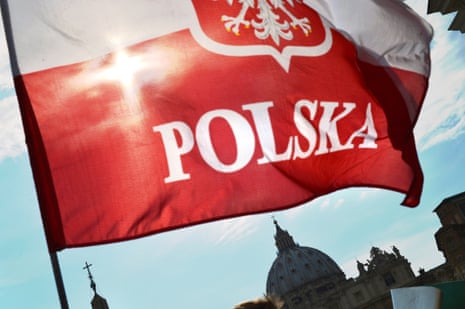“We don’t want terrorists here,” the Polish pensioner says, when asked about EU plans to resettle refugees more broadly across the continent. “Have you seen what they’re doing in the west?”
It’s a popular view here, if a baffling one. Poland is little affected by the refugee crisis in Europe, and accepts vanishingly small numbers of migrants. And yet the country has some of the most pungent views on immigration on the continent. A recent survey for the television station TVN found that two-thirds of Poles share the same hostility towards immigrants expressed by the Warsaw grandmother cited above.
According to a study in 2013 by the Centre for Research on Prejudice – a professional academic centre at the University of Warsaw – as many as 69% of Poles do not want non-white people living in their country.
A vast majority believe that immigrants take work away from Poles and that their presence is detrimental for the economy. It’s a view shared more broadly in eastern Europe, despite insignificant migrant flows in all of Poland’s eastern neighbours.
Politicians are in a fix. On the one hand, the EU has asked Poland to do more to resettle foreigners in the name of European solidarity. Some of Poland’s partners note that it has done very well out of EU membership. Now is the time to give back.
On the other, the ruling Civic Platform faces a tough challenge to be re-elected in autumn elections. It is not the only government finding it hard to stay on the right side of both the electorate and the eurocrats.
“People just don’t want immigrants here,” one senior Civic Platform politician says. “They don’t understand them, they don’t like them, and believe that their maintenance is too expensive.”
As a result, the government has consistently protested against EU allocations for refugee quotas, which suggest that next year Poland should take about 1,000.
In the spring, Civic Platform found itself under pressure from NGOs that appealed for the admission of 300 Syrian Christian families threatened with death by Islamists (but it was stressed that they were Christians, and therefore less culturally alien).
According to the UN high commissioner for refugees, Poland has pledged to accept just 100 Syrian refugees between 2016 and 2020.
Poland has never been a hospitable country for refugees. In 2014 the head of the office for immigration granted protection to just 732 foreigners, and refused entry to 2,000 people. Of those accepted, 115 were Syrian – although civil war in Syria has forced 4 million people to flee. About 5,500 cases were dismissed, primarily because refugees were trying to reach western Europe, particularly Germany.
Representatives of NGOs told the newspaper Gazeta Wyborcza that Poland does not want even a few hundred refugees, although the EU quota is a mere drop in the ocean for the 38 million residents in the country.
“Poland has never had a serious public debate about refugees. Nobody has ever tried to explain to Polish people that one of the moral and formal obligations of EU countries is to help those who seek shelter because they are persecuted,” says Weronika Rokicka from Amnesty International Polska.
“The government should carry out a major educational campaign. For years no one has done this and now that a crisis has erupted associated with the wave of refugees, Polish people are completely unprepared.”
Surveys show that for a majority of Poles the world’s problems should should be dealt with by someone else.
Politicians can sense this mood. It’s no accident that – according to OECD statistics – Poland was the lowest contributor of development aid in proportion to gross national income in 2014. Development assistance last year fell from 0.1% of gross national income to just 0.08%.
One again, the government broke its solemn commitment that this year Poland would spend 0.33% of national income on development aid. This attitude is striking for a country that for three decades has taken money from foreign countries in handfuls.
Under martial law, many Poles received packages from the west filled with clothes and food. In the last decade Poland has received tens of millions of euros from the EU in development assistance.
The ruling political party as well as the right-wing opposition Law and Justice party belong to a generation that often sought political asylum in the west in the 1980s - and usually got it.
It would seem that the Solidarność generation is not too eager to prove its own solidarity.
